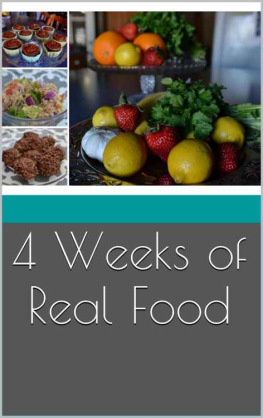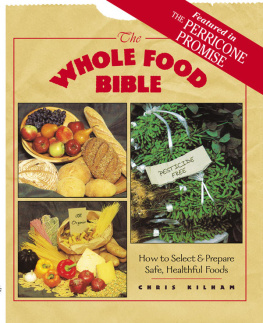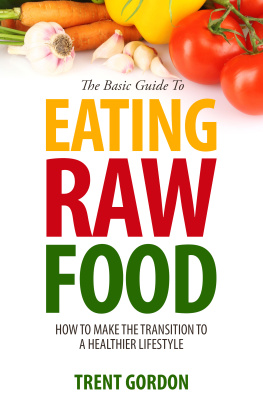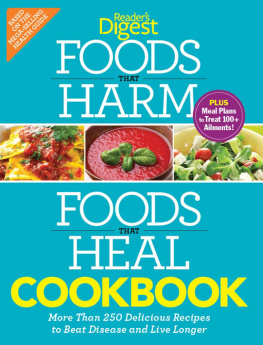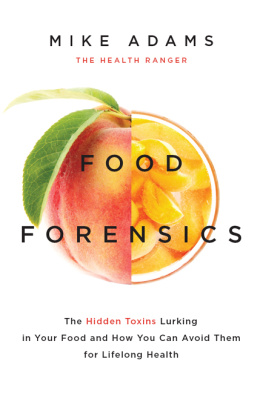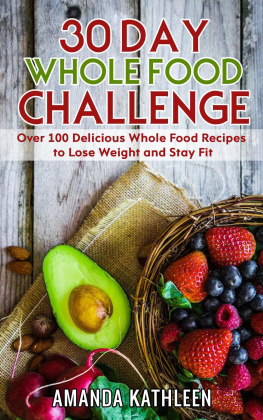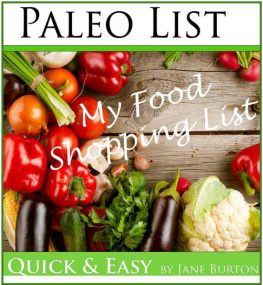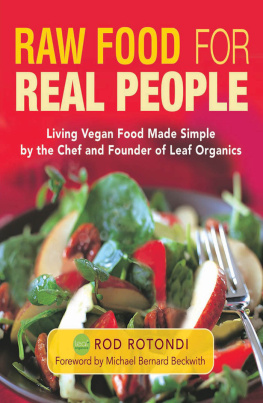4 Weeks of Real Food
Introduction
Chapter 1: The Dangers of Heavily Processed (Fake) Foods
Chapter 2: Nutritional Aspects of Real Food
Chapter 3: Health Benefits of Real Food
Chapter 4: My 4 Weeks of Real Food Experiences
Chapter 5: Saving Time & Money While Eating Real Foods
Chapter 6: Supporting Your Liver
Chapter 7: How to Naturally Reduce Blood Sugar, Insulin Resistance, & Inflammation
Chapter 8: Dealing With Stress
Chapter 9: Changing the Way You Think About Food
Chapter 10: Making Your Real Food Plan
Chapter 11: Recipes
Chapter 12: Real Food Resources
Chapter 13: References
4 Weeks of Real Food
Introduction
I am a firm believer that real foods can prevent troublesome conditions such as obesity and other disease. I also believe in the ever-increasing evidence that fake foods contribute to obesity and illness. I wanted to write this book because I believe that eating real foods can change lives for the better. When people seek out books such as this one, it is usually either to lose weight or to get healthy. The great thing about eating real foods is that doing so will help you meet both of these goals. Too often with other plans, a tradeoff such as compromising your health in order to lose weight must be made. Youd better believe that when you adhere to this plan you will not have to choose between your waistline and your cardiovascular system.
This book includes:
- Research on the adverse effects of fake food
- Research on the health benefits of real food
- Real food recipes
- A step-by-step guide to help you to make a real food eating plan
- Tips on saving time and money while eating healthy
- Random things I learned along my real food journey that can make your experience smoother
- Tips for reducing stress
- Tips for reducing cravings
- Tips for setting goals
- Tips for dealing with obstacles that can derail your efforts to eat healthy
- Resources to help you eat real food
- A sample shopping list
- A sample food journal
- A list of ingredients to avoid
Why Eat Real Food?
I recently set out on a journey to see what benefits I could personally gain by only eating real food for 4 weeks. This book will allow you to learn from my experiences so that your transition to a healthier lifestyle will be smooth. I thought that eating only real food wouldnt be too hard as I was already eating quite healthy (or so I thought). In fact, when I shared my intentions with my husband he looked at me as if I told him I was going to start breathing air and said, Dont you do that already? Rather than punching him, I calmly said that I wanted to see what impact eating only real food could have.
- Could it reduce my chronic headaches and muscle pain?
- Would my skin improve?
- Could my mommy middle finally become a thing of the past?
Prior to my 4 week journey, I did try to avoid (but did not completely abstain from) genetically modified foods, trans fats, added sugars, chemical additives, and so on. But I wanted to see what impact taking all of the junk out of my diet could have. Once I began to do so, I started to see how unhealthy so called health food could be. Ill share these finds with you so that you can avoid these pitfalls.
Lastly, underneath it all, I am a health nerd who loves researching the benefits of food. As such, I researched the benefits of real foods and the dangers of fake foods until I practically became cross-eyed. Based on said research, I have come to believe that real food can prevent disease, naturally control body weight, and restore health. On the flipside, there is a great deal of evidence that fake food contributes to weight gain, inflammation, discomfort, and disease. I will be sharing this research with you so that you can examine the evidence and make judgments for yourself.
Please note that there are bound to be more benefits of real food and side effects of fake food that are not listed in this book. Research in these areas is vast and continuously being performed. If I had listed every study ever conducted on these issues, I most likely would never be able to complete this book. However, I do feel that there is more than enough information here to educate you on these issues.
Chapter 1: The Dangers of Heavily Processed (Fake) Foods
Processed foods are foods that have been changed in some way from their original form. If you want to get technical, food preparation such as cooking and chopping is a form of processing food. Such acts are usually safe and really arent what people are referring to when they talk about avoiding processed foods. We can get into trouble when we eat those foods that have been heavily processed to the point where nutrients have been destroyed and/or removed and artificial ingredients have been added.
Many health professionals now acknowledge the drawbacks of processed foods. Research suggests that processed foods promote obesity and other diseases . In addition, there is growing evidence regarding the health benefits from avoiding these foods. In fact, data suggests that those who eat minimally processed grains tend to have less belly fat and less inflammation than those who eat heavily refined grains (1).
Making a Case Against Fake Foods
There are many synthetic ingredients and other additives lurking in our food. Several of these ingredients are linked to very serious health problems. The next section details just some of the ways that such ingredients can harm your health.
Not too many people would argue that processed foods are unhealthy. But just how unhealthy are they? Very! Some of the downfalls of processed food include:
Pesticides
Pesticides are chemicals that are sprayed onto food to deter insects. Pesticides are often found within genetically modified foods (GMO) and are sprayed onto some types of non-organic food.
Research suggests that consumption of pesticides may :
- Increase cancer risk ( 2 & 3 )
- Disrupt hormones ( )
- Contribute to neurological dysfunction ( )
- Contribute to Parkinsons and Alzheimers ( )
- Contribute to problems with attention and attention deficit hyperactivity disorder ADHD ( )
- Increase autism risk ( )
- Contribute to birth defects ( ) and the risk of neural tube defects ( )
It is important to note that pesticides are certainly not only found on fake, processed food. Pesticides can be on real food too. However, they do have a strong tendency to show up in processed foods.
How to avoid pesticides : Buy USDA certified 100% organic food, wash produce thoroughly, grow your own foods without the use of pesticides, and avoid GMO foods. If you cannot buy organic, choose foods that are less likely to be contaminated. You can visit websites such as the Environmental Working Group ( www.ewg.org ) to determine how likely a particular food is to be contaminated.
Trans fats
Trans fats are fats that have extra hydrogen added to them. This turns the fat into a solid and helps extend the shelf-life of products.
Research suggests that trans fats :
- Promote weight gain ( )
- Increase insulin resistance ( )
- Promote belly fat ( )
- Promote inflammation ( )
- Promote increased LDL cholesterol ( 11 &12 )
- May promote heart disease ( 11 & )
- May promote cancer ( 14 & 15 )
- May promote diabetes ( )
How to avoid trans fats: Trans fats are commonly found in baked and/or fried packaged foods. Look for hydrogenated on the ingredients listand if you find it, DO NOT EAT IT!
Please do not fall victim to tricky trans fat labeling. In particular, sometimes a label will boast no trans fats and still contain them. This is because manufacturers are currently only required to list a quantified amount of trans fat if there is over a half a gram in the item. You can still determine if it does in fact contain trans fat because it will still be listed in the ingredients list as some form of hydrogenated oil . This is just one reason why inspecting ingredient lists is very important.
Next page
